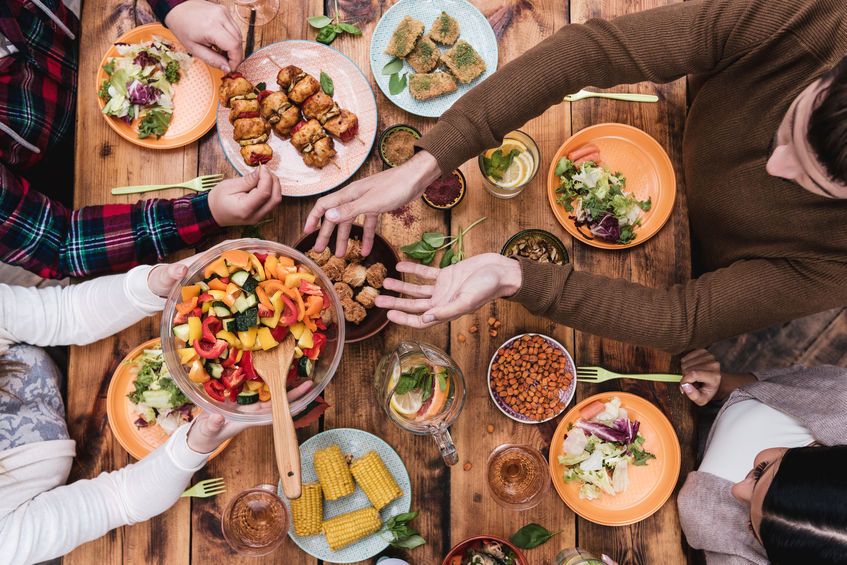6 Categories of "Never-do"
Table Manners
Sharing a meal is an inclusive experience. The company, the food, and the conversation work together to blend the time at the table into a nourishing of body and soul.
Part of this experience includes individuals "flying under the radar" of being noticed for how we eat and, therefore, avoiding the judgments of fellow diners. No one is perfect and we all commit faux pas when dining with others.
But whether or not our dining skills are polished or a little rough around the edges, there are things we never do that would bring our common courtesy into question.
Napkin “No-no’s”
- Using it to blow your nose, wipe your face, or blot lipstick.
- Tossing the napkin on the table.
- Spitting food into your napkin is no way to be rid of it.
- Napkins belong nowhere but on your lap.
- Don't place on the table at the end of the meal until your host does.
Properly used, napkins are the most important tool a diner has. Their use signals the beginning and ending of the meal by the host, and they are convenient for catching crumbs and drips.
Space Invasions
- Never reach or lean over someone else’s plate or across the table. This includes shaking hands when others are already sitting.
- Helping yourself to bread before the host has signaled the meal has begun.
- Taking food from someone’s plate.
- Asking another diner for a bite.
- Moving plates around to suit yourself.
- Placing unwanted food from your mouth on the table.
- Drinking before the host has signaled that the meal has begun.
- Eating before others have been served or before the host signals it’s time.
- Talking or laughing loudly such that it's interruptive.
- Being anything other than kind to the server.
Our space at the table is our own, but at the same time, we share common space with all the other diners, too. Being mindful of the boundaries between personal and shared space can prevent accidents and spills and help everyone feel respected and honored.
Unmannerly Sights and Sounds
- Picking your teeth with your finger or a toothpick.
- Using your tongue to cleanse outer limits of your mouth.
- Scratching yourself or repeatedly touching your face, mouth or hair.
- Swishing your food in your mouth. Slurping!
- Belching or burping.
- Fidgeting or playing with silverware.
- Knife blade scraping or screeching on the plate.
- Talking with your mouth full.
- Taking really big bites that cause difficulty chewing.
- Applying lipstick at the table.
- Slouching in your chair.
- Making a mess of your table space with your food.
- Eating with one arm on the table or leaning on the table.
- Leaning back in your chair with your hands on the back of your head.
- Eating with your fingers - when you're not eating finger foods.
- Shoving food onto your fork with your fingers.
What we can’t help but see and hear while dining together can leave unpleasant impressions. Being aware that only we can manage ourselves as we engage with others over a meal, and being mindful of shared space, will make everyone glad they are with you.
Utensil and Glassware Errors
- Leaving utensils hanging off your plate.
- Bringing wine or beverage to the table from previous reception. (Unless invited to do so.)
- Licking or sucking on utensils.
- Stabbing your food.
- Knife blade aimed outward. (Read by others as "aggressive.")
- Waving or pointing with utensils during conversation.
- Using a butter knife for anything but spreading butter.
- Placing a used utensil on the table or tablecloth. ("Used" always belongs on a plate.)
- Bringing a thermos or water bottle to the table when it is already set with glassware.
- Picking a dropped utensil or napkin up from the floor.
A well-set table feels orderly and comforting, unless it’s not there—or unless diners upset the balance by mindlessness. Disorder doesn’t have the same appeal as order.
Table Conversations that Raise Eyebrows
- Updating everyone on your latest diet.
- Complaining or bringing up unpleasant topics.
- Engaging in ‘conversation stoppers’ such as politics, religion, or topics of a very personal nature.
- Talking to one neighbor at the table, but forgetting the neighbor on the other side.
When people dine together they have given their permission to be involved in pleasant conversation. At a dining table, everyone should feel welcome. This means sharing talk time and engaging in topics that will contribute to the general good (and good digestion) of all.
General Bad Dining Habits
- Sitting down without first being invited to sit.
- Hanging handbags on the back of chairs. This is not only potentially disruptive, it might also invite trouble.
When you dine, assume that not everyone knows the guidelines for table etiquette. There is no need to correct someone if a rule is broken. Leading by example usually makes a stronger statement of your good manners.


No comments:
Post a Comment
Note: Only a member of this blog may post a comment.